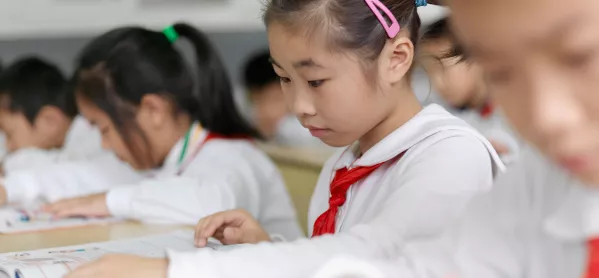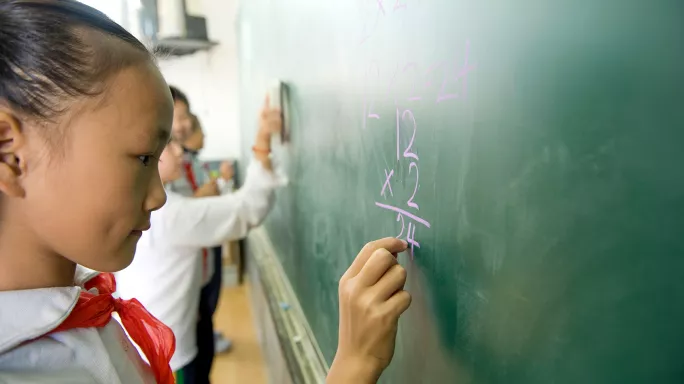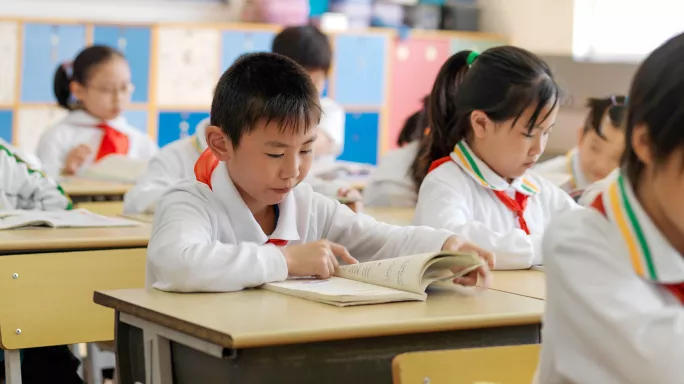- Home
- Analysis
- Specialist Sector
- How reforms have affected British schools in China
How reforms have affected British schools in China

The past two years have not been the easiest for those of us who have been working in China in the ever-growing international education sector.
Attitudes in the West towards China have inevitably changed following events in Hong Kong, as United Nations reports of human rights abuses against the Uyghurs in Xinjiang have filtered through, and question marks about the origins of the global pandemic have surfaced.
On top of that, the reaction of the Chinese government to the trade wars - opening the door for significant internal reforms, especially against private businesses and entrepreneurs - has made life for the international community in China progressively harder.
- International schools: How Covid is reshaping international education
- Tes’ 10 questions with... COBIS chief Colin Bell
- Interational Baccalaureate: The man helping the IB find its voice
As part of these reforms in 2021, there appeared to have been a concerted campaign by the government to reverse trends that had been appearing across the education sector in China.
This has already had a big impact on the international school community.
What once appeared to be an unstoppable period of expansion for British schools in China is now seemingly coming to an end - and yet a new era awaits.
Big changes for British international schools in China
So what has changed and why?
Perhaps the most notable change occurred in July last year when the Chinese government unveiled the Double Reduction regulations, which halted after-school tutorial services in their tracks and also controlled the extent of homework set to Chinese students.
Then came a ban on the use of international curricula and foreign textbooks that made it just about impossible to teach the sort of mixed East-West curriculum that had become increasingly commonplace.
Whilst primarily seeking to limit profiteering in the private school sector, the Chinese Communist Party also saw these developing trends as socially damaging.
Children’s mental health was suffering under a mountain of homework and after-school activities, and the soaring cost of education was having demographic implications as parenting became prohibitively expensive, thereby reducing the birth rate.
But also, politically, the private school juggernaut had resulted in nearly 1,000 at least part English-medium schools open in China, spreading Western values and attracting the influential upper middle class.
This is obviously a real challenge to the Chinese government.
Last year’s regulations came hot on the heels of controls passed since 2017 that have made doing education business in China far less of a garden of opportunity than it had appeared earlier in the century.
Extracting profit from schools was curtailed, a lottery process to control admission to private schools was enforced, and visas and letters of invitation for staff and their families were limited.
The final nail in the coffin was rather euphemistically named “the Law on the Promotion of Private Education”, unveiled in September, which capped enrolment to private schools to no more than 5 per cent of the Chinese study body in the compulsory stage (aged 6-15).
These reforms will stop the expansion of the national private sector as numbers are already well ahead of the 7 per cent figure in the UK.
According to China’s ministry of education, private schools currently educate 10.8 per cent of the whole cohort, and in some areas like Shanghai and Shenzhen over 20 per cent.
This action was taken by the Chinese Communist Party to try and address the elitism fostered by the surge of private education, which does not sit easily within a communist framework.
Private schools create and then perpetuate inequality.
All this means that new licences to open schools are like gold dust and many of those private schools currently following international curricula are either coming back under state control, closing or having to completely readjust their curriculum approach.

Hence, for many, the road forward has suddenly become rather bleak.
According to Beijing-based Venture Education, 14 British schools opened in China in 2020 with another 40 planned.
The pandemic and government reforms have, however, roadblocked those international schools either in their early stages or on seeking market entry. There have been several notable casualties, with Westminster probably the most noteworthy.
In response, many British schools thinking of opening in China have sought opportunities in less complicated jurisdictions: Rugby and Harrow are opening in Japan next year, and Shrewsbury in Cambodia the year after, for example.
On top of all this, for those that remain committed to the market, the Chinese authorities have maintained from the onset of the pandemic stringent controls on entry into the country and exit, and on internal travel.
Flights are cancelled, travel restrictions abound. Re-entry into China for those who do manage to get out has become so risky that most teachers have opted to stay in China for fear of losing their jobs if they are unable to enter or facing lengthy stints in quarantine.
Many staff have not seen their families in the West for over two years, and it is therefore no great surprise that in 2022 many international teachers will not renew contracts and will leave.
The teacher recruitment challenge
Most of my former headteacher colleagues working in schools across China are facing retainment and recruitment difficulties.
Increasingly, the recruitment process is recycling international staff remaining in China.
This, of course, creates a pecking order that means new schools and those with lesser reputations are finding it challenging to fill teaching vacancies.
The shortage of Western teachers is hastening what was already a growing trend towards the localisation of international staffing, and more and more of the 1,000-plus international curriculum schools in China will seek to use Chinese bilinguals, many returning from living or studying overseas, to deliver their curriculum.
This is in no way a bad thing. In fact, it may well serve as the next stage in the altering of what had previously been a rather neo-paternal intervention in Chinese education by the Western teaching community.
The sector will now be forced to find greater balance and become more self-sustaining under the controls laid down by the party.
However, despite the shortage of teachers and restrictive legislation, the market for a good quality internationally focused education in China will not disappear.
China continues to expand economically. its Belt and Road Initiative will result in more and more Chinese working overseas. Chinese investment and global purchases mean Chinese investors and workers need a global understanding and high levels of English language skills.
British and American universities will continue to be the aspiration for many Chinese families, and international qualifications will therefore not slip off the agenda despite the government’s push to reassert the Chinese national curriculum.
We are, therefore, seeing a realignment of international education in China. Many international teachers will be heading out, seeking posts either in other parts of Asia, the Middle East or even back in Europe.

However, there will probably not be sufficient jobs for all these teachers, and some will perhaps reluctantly remain in China and adapt to the changing situation.
These changes will probably continue for a few more years, but, as always in China, the application of reforms will vary from locality to locality.
Local demand, particularly for the sort of international skills that the developing China still needs from overseas, will ensure a future for international education.
China evolved from a developing economy under Mao to an investment-driven powerhouse under Deng, and it is now maturing into a consumer-led economy focusing on the domestic audience under Xi.
This will remain fertile ground for the right sort of international education.
The expanding Chinese middle class offers a massive opportunity. According to the Center for Strategic and International Studies in the US, China’s middle class has grown from 3 per cent of China’s population in 2000 to just over half, some 707 million people, in 2018.
Whether international-facing schools are in collaboration with the government or remain independent, the demand for places will remain.
Much of this demand will be in the Greater Bay Area, where nearly 90 million people live and which, especially in Shenzhen, has already seen a huge expansion of international education.
Recently the Guangzhou authorities announced ambitious plans that include the establishment of 50 internationally facing schools.
British schools, like Gordonstoun, are seeking to be among their number, proving that the demand - and the desire to meet that demand - is not going away.
As the impact of the restrictive legislation softens - and this will take time - the green shoots of international education should re-emerge on the East Coast in Shanghai and in Beijing, and slowly but surely into the rest of China.
Time to innovate
The golden goose that produced the explosion of international bilinguals may not return with the extraordinary vitality we saw before, but it will reassert itself: international education with Chinese characteristics.
At these schools many of the teachers will be returning Chinese, products of the last generation of overseas students who are now returning to China seeking work.
Alongside these Chinese returnees will be successful and effective international pedagogues with good curriculum knowledge and a commitment to seeing education in China develop.
Change is always painful. The pandemic has occasioned a new face of education in China.
But British education - as it has so many times before - will no doubt adapt to the changing scene.
David Mansfield has held posts as headmaster of Dulwich College Beijing and dean of Buckingham International School of Education. He is also a former executive head of YK Pao School in Shanghai, for whom he is a senior adviser
You need a Tes subscription to read this article
Subscribe now to read this article and get other subscriber-only content:
- Unlimited access to all Tes magazine content
- Exclusive subscriber-only stories
- Award-winning email newsletters
Already a subscriber? Log in
You need a subscription to read this article
Subscribe now to read this article and get other subscriber-only content, including:
- Unlimited access to all Tes magazine content
- Exclusive subscriber-only stories
- Award-winning email newsletters
topics in this article



